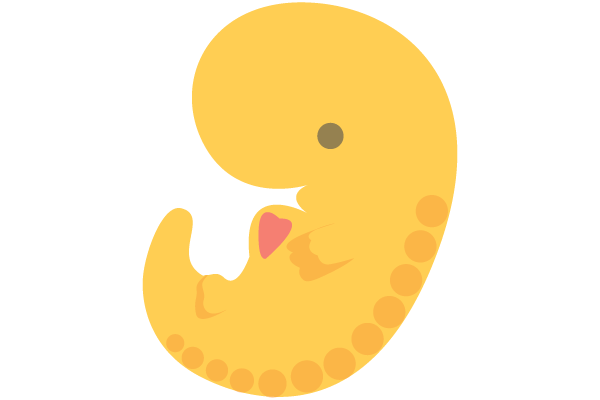
6 weeks pregnant
For information about weeks 1 through 11 of a twin or multiple pregnancy, tap here.
Pregnancy is in full bloom, and unfortunately some common symptoms might be starting to kick up now too.
How’s Baby?
Baby is now the size of a blueberry, measuring approximately 1/4-1/2 an inch long. This may not seem huge, but just think about how much your little one has grown in the past month, from a tiny collection of cells to the increasingly complex human being-to-be who is currently in the process of sprouting all of their facial features. Your baby’s cute little nose and curious eyes are just starting to form, although right now they merely look like little dark spots on an oversized head. Passages and arches that will grow and develop into parts of Baby’s ears and jaw are forming, and their nose won’t be far behind.
Development of Baby's lower body lags behind that of the upper, making them look a bit like a mermaid, and they may already be wiggling their flipper-like arms! Baby is also starting to straighten out from their formerly curled position, and that tail is making its way to its final destination in their back.
These upcoming weeks are some of the most important for Baby developmentally, so if you aren’t on a prenatal vitamin yet, it’s important to start taking one immediately. During this week, Baby’s neural tube is beginning to close, so it’s especially important to be getting folic acid — from prenatal vitamins, as well as from the rest of your diet — as it can help prevent neural tube defects.
What's new with you?
A lot of changes are happening!
One big change you might already notice is feeling tired. But not just normal tired. Even though your body hasn’t grown in size much yet, it’s doing a lot of work that can leave you fatigued. Your body is producing significantly more blood than it’s used to in order to get nutrients to Baby, which is an energy expense that may leave you with lower blood pressure and lower blood sugar. The added progesterone coursing around your body could also be tiring you out. If you feel like you can manage, going for a walk, doing some gentle yoga, or engaging in another physical activity that you enjoy might help a bit: the endorphins you release may make you feel less sluggish. And you should listen to what your body needs and rest, nap, or tuck in for bed early as needed.
Your breasts are also likely to be sore at this time, and your nipples may stick out more than normal. This tenderness will probably last through your first trimester, as your breasts continue to grow. This change is completely normal, and is simply a product of increased blood flow to your chest as your body primes itself for breastfeeding.
And if you’re feeling sick to your stomach right now, you aren’t alone — over 70% of pregnant folks experience nausea in the first trimester. During the sixth week of pregnancy over 80% of pregnant folks experience nausea, which often starts in the morning (hence the term “morning sickness”) before dissipating in the early afternoon. However, this term can sometimes be misleading, because nausea during the first trimester is not exclusive to mornings, and that awful feeling could hit you at any point during the day or night. A few things that may help?
Try eating several small snacks throughout the day, avoiding triggering smells, taking your prenatal vitamins with a meal, having food or drinks with ginger, keeping hydrated, and getting plenty of rest. And if you can’t seem to find much relief, be sure to speak with your healthcare provider. And for serious morning sickness or concern for dehydration, you should definitely speak with your healthcare provider.
Something else you should call your healthcare provider about? If you experience spotting or vaginal bleeding right now. While it is common in early pregnancy, it can also be an early indicator of a miscarriage or an ectopic pregnancy.
Speaking of, you’ll probably be choosing a healthcare provider around now, and your first prenatal consultation will likely happen around week eight. There are a few different types of healthcare providers you can use during pregnancy, but the most common are OB/GYNs and Certified Nurse Midwives (CNMs). Women with certain risk factors may need to see an obstetrician (OB), but women with no elevated risks are typically able to see CNMs as their primary healthcare provider during pregnancy, as CNMs are able to provide most of the same services that an OB can.
Reviewed by the Ovia Health Clinical Team
Read more
Sources
- “Morning Sickness.” March of Dimes. March of Dimes. September 2020. Web.
- Sir John Dewhurst. Dewhurst's Textbook of Obstetrics and Gynaecology. 8th ed. Keith Edmonds. John Wiley and Sons Ltd, 2012. Print.
- S Narendran, R Nagarathna, V Narendran, S Gunasheela, HR Nagendra. "Efficacy of yoga on pregnancy outcome." Journal of Alternative and Complementary Medicine. 11(2):237-44. April 5, 2015.Web.
- AK Sfakianaki. "Prenatal vitamins: A review of the literature on benefits and risks of various nutrient supplements." Formulary Journal. ModernMedicine Network. January 31, 2013. Web.
- Mayo Clinic Staff. "First trimester pregnancy: what to expect." Mayo Clinic. Mayo Clinic. February 26, 2020. Web.
- Mark A Curran, M.D. “Fetal Development.” Perinatology.com. Perinatology.com. March 31, 2019. https://www.perinatology.com/Reference/Fetal%20development.htm#1.




